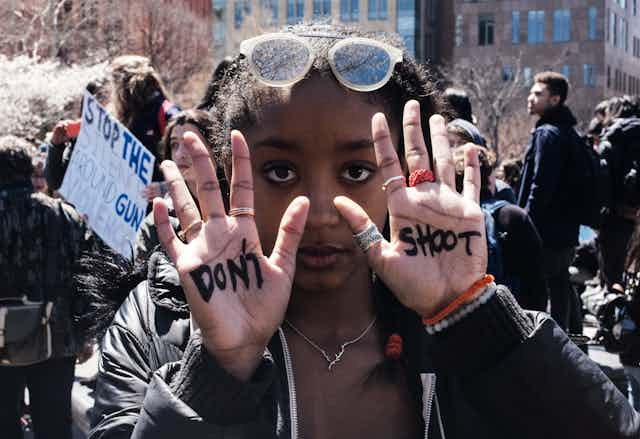More people have died or been injured in mass school shootings in the United States in the past 18 years, than in the entire 20th century. Today, activists are increasing pressure on the government to act, to keep children safe at school. There have been powerful speeches from survivors, mass school walkouts and symbolic protests; including a national “die-in” to be held outside the Capitol in Washington DC.
This powerful movement led by young people may yet spark the legal changes needed to prevent more school shootings from happening in the future. But there are already many young people who are living with the effects of the extreme trauma of a mass school shooting. My colleagues and I recently reviewed 11 research papers from 2014 to 2017, which sought to understand the psychological impacts of school shootings on young people – and how they vary from person to person.
Most survivors of school shootings will make a good recovery in the months that follow. But for others, the experience will trigger long term, life changing symptoms of psychological distress, including post traumatic stress disorder (PTSD). There may also be other consequences, which aren’t categorised as psychological disorders, but which still have a substantial impact on the young person’s life – their performance at school may be impaired, for example.
Understanding the impacts
In the field of psychology, it’s well established that the impact of trauma is cumulative – in other words, experiencing multiple traumas – especially in childhood – results in more severe and complex symptoms. Research that focuses on school shootings is consistent with this, showing that students who have dealt with previous trauma are at greater risk of long term difficulty after experiencing a school shooting.
After the 2008 shooting at the Northern Illinois University, a group of researchers found that the students who displayed the most resilience tended to have lower levels of pre-shooting trauma, less exposure to the shooting itself and less difficulty with regulating their emotions. Those with more serious problems reported that before the shooting, they had been more inclined to avoid uncomfortable internal experiences such as stress or anxiety. Another risk factor for longer term distress seems to be experiencing dissociation – a sense of detachment – during the event itself.

Here’s another problem. Mass school shootings are carried out almost exclusively by white male teenagers – and yet the evidence suggests that black students are disproportionately targeted under “zero tolerance” policies that schools typically implement in the wake of such events. Though Hispanic and black students make up 45% of the student body, they constitute 56% of those expelled under such policies. This is another, indirect psychological consequence of school shootings for young people, concentrated on black and minority students.
We also know less about the direct effects of school shootings on students of colour – most psychological studies are conducted on samples of white people, and researchers at NIU have demonstrated that experiences of black and minority young people are likely to be underrepresented due to higher rates of attrition.
Seeking support
Certain factors, such as social support, seem to mitigate the impact of a massive trauma to some extent. In relation to school shootings specifically, researchers found that students who sought social support – and perceived this process positively – felt better able to help themselves through recovery and reach out to others. This led to lower levels of distress for those students. Other researchers in Finland showed that after a school shooting there, students stressed the importance of leaning on their “natural” support networks of friends, partners and family.
Young people have different trajectories of recovery, which suggests that they may not all benefit from the same type of support at the same point in time. But students who show signs of being at greater risk from trauma – for instance, those who have trouble regulating their emotions – could benefit from targeted therapy, where they can be taught strategies to address these difficulties.
Protective factors can also be fostered through therapy. Helping students to reach out to their friends and families is important – they need to feel a sense of social support, and they are likely to turn to their existing networks first to get it. Therapy can include families and partners too, and can provide them with the tools they need to support loved ones following a mass shooting.
The right response
Group sessions might be healing in specific ways for people who have experienced a collective trauma. Researchers studying the aftermath of the Virginia Tech shooting noted that group therapy could provide opportunities for those who don’t feel ready to speak, to benefit passively from social support and a sense of community.
Although there has been a significant amount of research into the psychological consequences of school shootings, the responses so far have too often been inadequate, and not based on evidence. The effectiveness of harsh “zero tolerance” disciplinary policies has been debunked – yet politicians in the US continue to propose the same type of measures in the wake of recent tragedies.
The US has still not introduced meaningful gun control measures – even though the vast majority of mass school shootings happen there. As long as young people continue to be traumatised in this way, it’s crucial to recognise that some survivors are more vulnerable than others, so that each can be given the support they need to recover.

